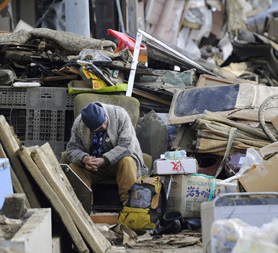Japan: Cold weather adds to quake victims’ suffering
Winter weather and fears of radiation are hampering relief efforts in Japan, where Save the Children say: “We are finding pockets of profound humanitarian need.”

While international attention focuses on the battle to contain radiation at the damaged Fujushima Daiichi plant, rescue workers are strugging through bitter winter weather to reach victims of the quake.
The number of people confirmed dead is around 6,900 but many thousands more are missing. Nearly half a million people are homeless and although around 2,500 shelters have been set up, most have no electricity. Aid workers report people huddled together around kerosene heaters. Fuel is in short supply because the tsunami damaged local refineries.
“Thousands of children have no proper protection against the cold and snow” Steve Mcdonald, Save the Children
Workers from Save the Children have been travelling into some of the most hard to reach and worst affected areas. Stephen McDonald, Save the Children’s response team leader, said: “As we push up the coastline from Sendai, we are finding pockets of profound humanitarian need.’
“Thousands of children have no proper protection against the cold and snow. If the temperatures drop even lower, as predicted, it could have a serious impact on the health of children. We are already seeing families huddling around gas fires for warmth.”
Save the Children estimates that 100,000 children were made homeless by the earthquake. The charity is setting up child friendly spaces, where children can play with toys while supervised, giving their parents time to look for food. The urgent need for relief has led the charity to expand beyond it’s normal child protection role and begin handing out emergency aid, such as blankets.
Elderly deaths
And the elderly are suffering in the cold. Soldiers reportedly found 128 pensioners abandoned at a hospital in Iwaki, six miles from the Fukushima nuclear power station and inside the exclusion zone around the plant. Fourteen died shortly after being moved to an emergency centre. Eleven other elderly people were reported dead at a retirement home in Kesennuma because of freezing temperatures, six days after 47 of their fellow residents died in the tsunami.
The medical charity Medicins Sans Frontiers is also working in several different areas hit by the quake. General Director of MSF Japan said that huge numbers of people are joining the rescue effort: “Numbers are not very clear but we are talking about between 80,000 and 250,000 people, coming mainly from the Self Defence Forces but also from other medical organisations and other foreign and government aid groups.”
He said the elderly were particularly at risk, saying they are seeing: “the usual chronic diseases in an elderly population: hypertension, cardiac diseases, diabetes. We have also seen some cases of hypothermia as well as dehydration. But it’s a limited number of cases compared to the vast number of people who have been displaced.”
The Government has admitted that the scale of the disaster is beyond anything they have ever planned for. Chief Cabinet Secretary Yukio Edano admitted the response was not quick enough: “The unprecedented scale of the earthquake an tsunami that struck Japan, were among many things that happened that had not been anticipated under our disaster management contingency plans. In hindsight we could have moved a little quicker in assessing the situation and coordinating all that information and provided it faster.”
Nuclear fears
China has sent 800 boxes of bottled drinking water and a 15-strong rescue team, as well as relief packages of blankets, tents and diesel. One of the problems is getting fuel and food to the areas, a task that Steve Mcdonald says is being hampered by radiation fears. “The situation in Fukushima is certainly having an impact on relief efforts further north,” he said. “The evacuation around the plant has created a new wave of displaced people and concerns over safety are making it difficult to deploy staff to the affected area.”
On Friday the International Atomic Energy Agency announced it would be holding an extraordinary meeting on Monday to discuss the ongoing nuclear crisis. Over 300 workers are now working at the Fukushima Daiichi plant, trying to restore power and restart cooling systems.
On Thursday the British search and rescue team said that it was heading home, having done extensive work in the north of Japan, but finding no survivors. The Department for International Development, who coordinated the rescue, said that heavy snow and plummeting temperatures made it very unlikely that anyone would now be found alive.
Hundreds of aftershocks have continued to shake Japan, leaving survivors terrified and preventing engineers from restoring internet access via undersea cables. More are expected in the coming days.